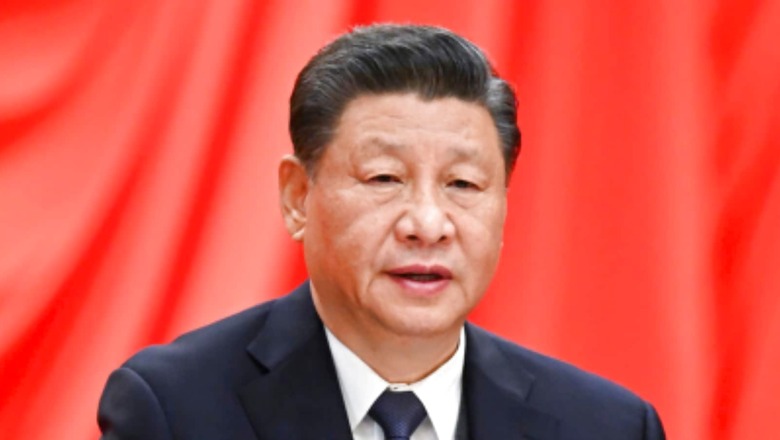
views
In the past few years, the Chinese government under Xi Jinping has been increasingly discussing and deploying new legal tools to strengthen its position on matters of foreign affairs. This strategy is reflected in a recent speech by Xi Jinping on the theme of rule of law, which was published in early February in the Communist Party’s leading journal, Qiushi.
When talking about the international environment, Xi said, “the world has entered a period of turbulence and change, and international competition is increasingly manifested in disputes over systems, rules and laws. We must strengthen the construction of foreign-related laws and regulations, improve the efficiency of foreign-related law enforcement and judicial affairs, and resolutely safeguard national sovereignty, security, and development interests.” He added that it was important for China to improve its laws and regulations related to sanctions, foreign interference and protecting overseas interests.
The speech is indicative of Beijing’s continuing desire to use legal tools as part of its foreign policy toolkit. In fact, over the years, there has been a gradual strengthening of China’s legal frameworks to this effect.
To begin with, in its first “Plan on Building the Rule of Law in China (2020–2025),” the Chinese leadership outlined its vision for a coherent and authentically Chinese legal system. It said that such a system should “basically take shape” by 2035. This document talks about the use of law to “preserve national sovereignty, security, and developmental interests.” It contains descriptions of the “one country, two systems” principle, and argues for using legal tools to deter interventions by “foreign forces”.
Section 25 of the plan outlines the international dimensions of China’s endeavours. It calls for developing a theory of international law based on a “socialist rule of law with Chinese characteristics.” It internationally publicises the Chinese concept of the “rule of law.” The plan also looks forward to boosting international legal cooperation within the BRI framework by establishing international commercial courts. The promotion of China’s institutional judicial assistance system and mechanisms is one of the major themes of the plan. Expanding international judicial assistance cooperation in the areas of extradition, repatriation of criminal suspects, and transfer of sentenced persons is an important venture. The plan finally requires the cooperation of international law enforcement to combat violent terrorism, ethnic separatism, religious extremism, drug trafficking, and transnational crime.
It is clear from above that China wants to influence global governance and international law by bringing in a “Chinese way” of doing things.
Other than this plan, there have been several new laws that have been enacted, which are linked to matters of foreign affairs. For instance, the new Data Security Law, which came into effect on September 1, 2021, put stringent conditions on the operations of foreign firms in China. Together with the Cybersecurity Law and Personal Information Protection Law, there is now a new regulatory architecture being put into place regarding data storage, processing, access and transfer. Firms operating in the mainland now have to go through a security assessment to send data overseas. Non-compliance with a foreign authority’s data access request resulted in a violation of PRC law, whereas compliance resulted in a violation of relevant foreign laws or court orders. The law called for hefty fines as well as serious consequences for violations. The takedown of ride-hailing giant Didi owing to data security concerns after its US IPO last year is an example of how seriously the Chinese government is approaching this issue.
Another example is the Anti-Foreign Sanctions Law, which was enacted on June 10, 2021. According to the government, this law was necessary to defend China’s interests by opposing foreign sanctions, particularly those imposed by the United States, on targeted Chinese businesses and individuals. The law followed a series of steps being taken to counter foreign acts. For instance, in September 2020, China announced the establishment of an Unreliable Entity List. Then in October 2020, the government enacted an Export Control Law.
Finally, in January 2021, the Ministry of Commerce promulgated the new Rules on Counteracting Unjustified Extra-Territorial Application of Foreign Legislation and Other Measures. The rules essentially functioned as a Blocking Statute, aimed at supporting Chinese and other companies threatened by US sanctions imposed on other countries and actors. The rules also authorised Chinese government agencies to take “countermeasures,” including adding foreign entities or individuals to an Unreliable Entity List. The main purpose of these legal changes has been to protect China’s “national sovereignty, security and development interests”. Also, ever since the enactment of these legal tools, the Chinese government has not been shy in their use. For instance, Beijing has sanctioned a number of individuals and organizations in relation to tensions around Hong Kong, Taiwan, and Xinjiang. American politicians like Marco Rubio, Ted Cruz, and Josh Hawley, as well as organizations such as Freedom House, Human Rights Watch, and MERICS, have been sanctioned. Most recently, Beijing sanctioned Lockheed Martin, Boeing Defence and Raytheon in connection with arms sales to Taiwan.
There is also an increased focus on national security-linked legislation in the Xi era. The list of so-called sensitive issues has kept on increasing rapidly. Some recent inclusions include maritime issues, healthcare and pandemics. These issues along with delicate issues like Xinjiang, Tibet and Taiwan.
From the above, it is evident that Beijing is developing a larger legal toolkit to bolster its national security, foreign policy and economic interests. In his speech, Xi Jinping also talked about promoting “the construction of a legal system applicable outside China’s jurisdiction.” This is a fair warning to anyone who believes that lawfare with Chinese characteristics is merely a matter of playing defence on key interests. Rather, it is aimed at reshaping global governance through a Chinese interests prism.
Swayamsiddha Samal is a Research Analyst at Takshashila Institution. The views expressed in this article are those of the author and do not represent the stand of this publication.
Read all the Latest Opinion News and Breaking News here




















Comments
0 comment